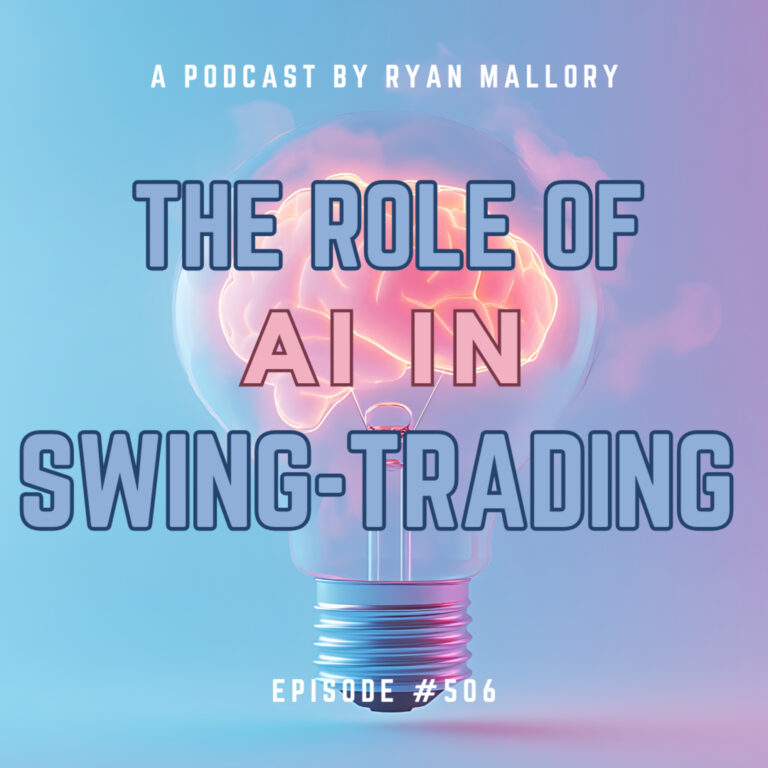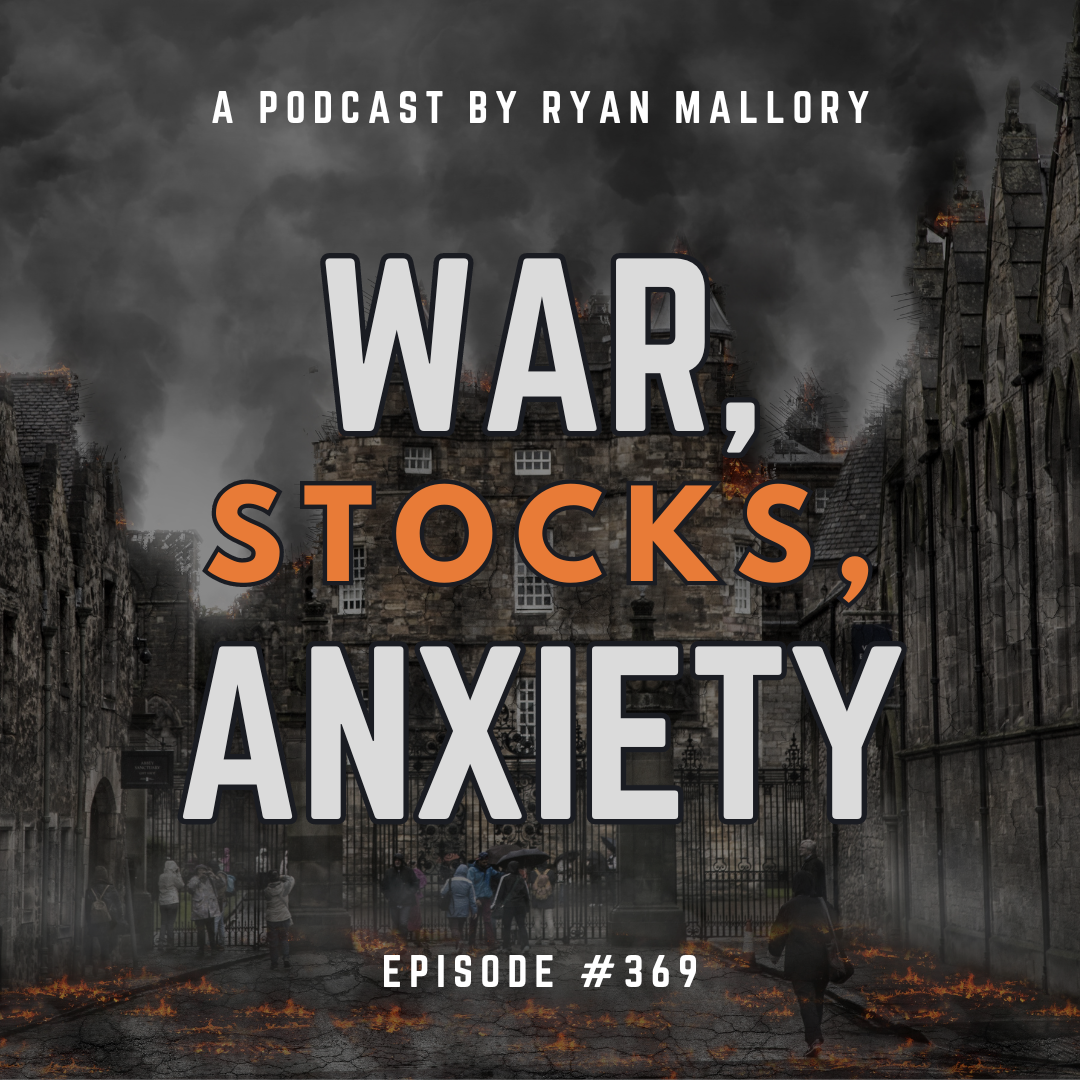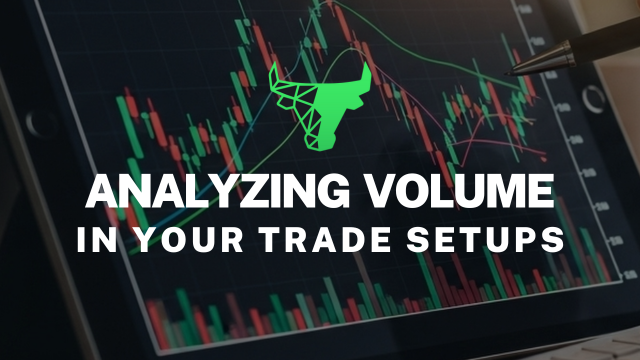Episode Overview
How do you manage swing trades in a market rattled with major headline events – particularly war? How does war impact the market and is it something that we should be considering in our swing trading decisions? I also cover how taking partial profits along the way leads to better risk management, and helps us to better avoid that feeling of getting out of a stock far too early.
Available on: Apple Podcasts | Spotify | Amazon | YouTube
Episode Highlights & Timestamps
- [0:07] Introduction
Ryan introduces the topic of war anxiety and how geopolitical events impact trader psychology and the stock market. - [1:42] Listener Anxiety Over Middle East Conflict
A listener named Wilma expresses fear of a market crash due to the Israel-Hamas war and struggles with holding positions. - [4:06] How War Events Impact Stocks
Ryan explains how most Middle East conflicts, even serious ones, usually don’t have a major long-term impact on U.S. markets. - [5:52] When Oil Becomes the Wildcard
He discusses how oil spikes, inflation, or U.S. military involvement can create bigger risks for the stock market. - [8:15] Managing Trades During Emotional Times
Ryan shares a Meta trade example and emphasizes the importance of managing risk over fixating on profits, especially during bear market rallies.
Key Takeaways from This Episode:
- Market Fear Isn’t Always Justified: Not all geopolitical conflicts, even major ones, result in market crashes. Let price action, not headlines, be your guide.
- Focus on Fundamentals: Ask how global events affect company earnings, product delivery, and revenues instead of reacting emotionally.
- Manage Trades Based on Risk: Profit-taking should be rooted in risk management, not fear. Reduce exposure incrementally to stay flexible.
- Partial Profit-Taking Helps: Booking profits in stages allows traders to reduce risk while still participating in potential upside.
- Don’t Let Headlines Control Your Strategy: Keep your trading plan rooted in data, not doomscrolling. Stay disciplined through volatile news cycles.
Resources & Links Mentioned:
- Swing Trading the Stock Market – Daily market analysis, trade setups, and insights by Ryan Mallory.
- Join the SharePlanner Trading Block – Get real-time trade alerts and community support.

Take the Next Step:
✅ Stay Connected: Subscribe to Ryan’s newsletter to get free access to Ryan’s Swing Trading Resource Library, along with receiving actionable swing trading strategies and risk management tips delivered straight to your inbox.
📈 Level Up Your Trading: Ready for structured training? Enroll in Ryan’s Swing Trading Mastery Course, The Self-Made Trader, and get the complete trading course, from the foundational elements of trading to advanced setups and profitable strategies.
📲 Join the Trading Community: Sign up for SharePlanner’s Trading Block to become part of Ryan’s swing-trading community, which includes all of Ryan’s real-time swing trades and live market analysis.
Full Episode Transcript
Click here to read the full transcript
0:07
Hey, I’m Ryan Mallory and this is my Swing Trading the Stock Market podcast. I’m here to teach you how to trade in a complex, everchanging world of finance. Learn what it means to trade profitably and consistently managing risk, avoiding the pitfalls of trading, and most importantly, to let those winners run wild.
0:25
You can succeed at the stock market, and I’m ready to show you how. Hey, everybody, this is Ryan Mallory with Swing Trading the Stock Market. Today’s episode, we’re going to talk about war anxiety and how all that loops into the stock market and how we can best navigate some very difficult times as it pertains to stocks.
0:49
Now, obviously, there’s a lot going on in the world right now as it pertains to the Middle East with Hamas and the terrorist attacks on Israel. That’s awful in itself, but when we start to relay it back to the stock market, we start to want to make decisions based off of what we’re seeing going on in the Middle East.
1:07
And long as I’ve been trading, there’s always been what seems to be a conflict, or in this case a war now. But in the past, conflicts on and off between these two people. And how does that impact the stock market? How is that affect stocks?
1:23
What are you supposed to be doing as it pertains to trading? And today I got an e-mail from a person. We’re gonna call this person Wilma cuz I don’t use people’s real names. I give them Florida rednecknames, Wilma rights. Hey Ryan, I’ve been getting antsy with my trades of late, getting out too early and seeing the winners run thereafter.
1:42
Now in new trades, I feel the same anxiety, and after a quick rally, I feel the need to sell the stock, even though it isn’t in my best interest. I have fears that this war in the Middle East is only going to get worse, and I’m looking at a big crash on Monday or sometime next week. How do I deal with these feelings?
1:58
Sincerely, Wilma, Good question, Wilma and my experience. And like I said, there’s been a lot of conflict in the Middle East, whether it’s between Israel, Hamas and Palestine, or even the United States and Afghanistan or Iraq. There have been tons and tons of events that’s happened in the Middle East, but how does that pertain to the stock market?
2:17
By and large, they don’t really matter. In fact, if you go back to Monday of last week and I’m recording this show on October 13th, so we’re talking about this past week. Over the previous weekend, there was a surprise terrorist attack on Israel. As a result of that when the futures opened on Sunday night, there was a huge sell off.
2:39
Now I tweeted out, I said guys never trust a Sunday night gap down. Doesn’t mean that the stock market can’t gap down on Monday and keep going lower and it has before. But by and large those Sunday gap downs are very questionable. And so we got the gap down.
2:55
We headed into the market trading you know 30 plus points lower and then all of a sudden we just ripped right back up to the upside once the market started trading. And that happens so often on Sunday night when the futures gap way lower and there’s a headline event there that a lot of people are panicking about and going into it.
3:12
I remember seeing people saying, oh, this is the worst thing I’ve ever seen. If you look at, I guess there’s a website out there that people look at, it’s like a Wall Street futures market over the weekend. And I don’t even think it’s anywhere near accurate, but people will oftentimes flock to that website because the markets closed, the real markets closed.
3:28
And so they’ll go to this like I guess fantasy stock market or something. And they’re like saying oh the futures are going to get up way lower and they’re like talking about big sell offs and it didn’t happen. So that’s what happened to money. That was a huge event that’s much worse what happened over the weekend to Israel than what I’ve seen in a long time.
3:46
And over the years I have not seen major sell offs as it pertains to the conflicts in the Middle East with Israel. And then we get the gig big gap down on Sunday night last week and then we rally thereafter. That also is a good sign that this event isn’t going to have a huge impact on the stock market.
4:06
And here’s the reason why A lot of people argue with me on this stuff. They think this is going to create a huge market crash. But this is what I would tell you to ask yourself. The events in the Middle East, as awful as they are. I know some people are going to ask, Ryan, why are you taking the events that are happening in the Middle East and making a podcast out of it about the stock market?
4:23
Because this is a stock market podcast. This is what I do. I have a swing trading stock market podcast and a lot of people have a lot of questions as to how it affects the stock market. Now is this incredibly important on the large scale of things to be worried about right now in this world?
4:40
Absolutely not. Now this is like way down on the list, but for the listeners out there, you guys want to hear about this and so I’m going to talk about it. So the Middle East conflict, this is what you want to be asking yourself, how does this affect stocks specifically? How does it affect earnings? How does it affect revenue and their ability to move products, sell inventory?
5:00
How does the conflict over there in the Middle East impact that? How does it affect the market? How does it affect gold? We’re seeing huge spikes in gold. So there is some impact there. We’re seeing defense contractors rally and I think the first day a lot of your defense contractors were up over 10% and we’re seeing a spike in oil, a huge spike.
5:19
Now it’s back into the 80s like it was prior to the conflict. We had a little bit of a dip before then. We had a rally this week and the only time that I’ve ever seen conflict in the Middle East become a problem is when oil starts spiking through the roof. Think about like the 10 year yield. Right now we’re seeing the 10 year yield just go to the stratosphere, right.
5:36
A lot of people are saying Oh my gosh, the mortgage rates are now over 8% because the 10 year yield is going through the roof. Now when you start seeing that with oil, we saw the same thing when war broke out between Russia and Ukraine. Initially we saw oil go like to $140.00.
5:52
Now it wasn’t all because of Ukraine. There was also some major inflation issues. We still have inflation issues, but back then it was far greater. Still great today, but but in terms of like the year over year increase, it was crazy. Oil was spiking okay. When that starts to happen, yeah, it does have an impact on stocks because everything becomes more expensive.
6:12
Transportation costs become more expensive. Trying to get goods that might be manufactured over in China here into the United States becomes more expensive. So yes, when oil starts spiking to major extremes and you’re getting these huge, like 5-6 percent bursts on what seems like a daily basis, you’re thinking of yourself, holy cow, is this going to 200 or something?
6:31
Yeah, that’ll have an impact on the market. And So what could drive oil prices higher? One on how it would impact Saudi production if it starts to affect their ability to produce and the supplies start going down? Yeah, maybe they’re dragged into the war. I don’t know. I’m just, I’m giving you scenarios here.
6:47
I’m not saying that’s going to happen, but I’m just saying like something happened from a war standpoint that affected Saudi Arabia’s ability to produce oil or other countries in the Middle East. Yes, you could see a huge spike in the oil. What else could cause potential issues for the market besides oil?
7:03
Let’s say the United States got involved and I’m not talking about like providing funding like what we do for Ukraine right now that’s probably going to happen with Israel. US will probably give Israel some money, but if US actually put boots on the ground, if we started sending Marines and started running missions, you know, with our Air Force, yes, that could cause some havoc in the stock market.
7:23
If Iran gets involved directly, let’s say they put boots on the ground, yes, that could be a sign of greater escalation in this war. And God forbid, the worst thing probably would be if there was some kind of nuclear event that resulted out of all this. Yes, that would hurt the stock market.
7:41
And I’m not making light of nuclear events. I’m just saying these are the kinds of things that would really put the stock market at risk of a major, major sell off. And as it pertains to managing your traits, obviously this listener has some issues, a little bit of anxiety.
7:58
They’ve been struggling some with getting out of stocks. First off, Wilma said she’s getting out too early and seeing the winners run thereafter. Now in new trade, she feels that same anxiety and after a quick rally, she feels the need to sell the stock even though it’s not in her best interest. Let’s go back to one of my first episodes and it’s really the mantra.
8:15
You go on the website, you see it there as well. Three points that drive my trading decisions. One, plan the trade, two, manage the risk, #3, let the profits take care of themselves. And if you do the 1st 2, the profits do take care of themselves, but the only way they take care of themselves.
8:31
If you do the 1st 2:00, if you don’t pay attention to risk, you don’t make plan out your trades, you’re going to have some horrendous outcomes. And so this person here is struggling with the profits, letting them take care of themselves. So one of the things that I do and trading also, it doesn’t mean that I don’t give a care in the world to the profits that I have in a trade.
8:51
Obviously I do. I’ve managed the trades, I book profits, I get in, I get out. But it’s all hinged on risk. Why do I book profits along the way? This past week I got into meta. Actually, I got into meta about a little over a week ago. On October 9th, I got into meta around 309 I believe it was.
9:09
And then I took a third out around 3:19. And then a day later I took another third of that original position at 322 for a 4% profit. And then two days later I closed the entire position out at 328 for a 6% profit. Why was that? Because we were having a bear market rally here.
9:26
We had a significant two-month sell off and then what you would normally get after a steep amount of selling is a bear market rally, a relief rally, a dead cat bounce back rally, whatever you want to call it. And so we’re starting to get that rally. I’m not going to trust this market at all because I know that if this is a relief rally, it’s going to run out in short order.
9:44
And if it doesn’t, well then I can continue holding the stock because the market’s not giving up any ground and it may be a smaller position. But I can always add future trades to the portfolio if proven wrong. If the market keeps rallying, takes out the July highs, and keeps on moving, I can add more trades to the portfolio.
10:01
I’m not limited by what I’ve already been in. Doesn’t mean that I can’t add new trades. In fact, I had plenty of trades that I could have added this past week if the market conditions allowed for it. But it didn’t. And so in a good market, would I have been that aggressive that I just laid out there with the Medi trade And I was also that way with Microsoft and MAS was another one that I got into very aggressive with these things.
10:22
I was booking the profits, you know, in a very aggressive manner. And that was because we’re in a bear market rally and those don’t last very long. Now in a good market rally, I will give stocks plenty of time to run up until earnings. It’s the earnings report I’m getting out of them because I’m not going to hold a swing trade through earnings.
10:39
But as it pertains to a good market and there’s no earnings ahead of me, yeah, I’ll let those suckers run. In fact, even though the market’s been down the last couple days, I would have probably still been in meta and Microsoft had it been a better market to be trading in. But it’s not.
10:55
So I went ahead and booked the profits quickly. But why am I booking the profits? Is it to make money? No, it’s to take risk off the table by doing that. I do make money by managing the risk. Ultimately, I can create some very profitable scenarios for myself in managing risk along the way means booking profits in your trade.
11:15
You’re taking risk off the table to where Okay, I don’t know how high a particular stock is ever going to go. It could go from 100 to 10 million for all I know. Okay, I don’t know. But there’s also the chance that it’s not going to go as high as I think it might. But I think it’s going to go from 100 to 110.
11:32
There’s a possibility that it only goes to 102. And so I need to be booking profits along the way to where if there is a reversal that I’m not getting caught with my pants down and I’m watching a position go from green to red, that’s one of the things that drive me more nuts than anything else is watching a position that’s solidly in the green go to red.
11:49
I hate it. Doesn’t mean that never happens, but I do hate it. So when I’m getting up three, 4% in a dead cat bounce rally on a stock like Meta, that’s a $800 billion company. Yeah, I’m going to start taking some profits along the way. And in doing so, it does free me up to allow it to keep on running. If it that final third or 2/3 of a position wants to go from 3% up to 10%, that’s great.
12:10
It might not be with a full position, but that’s okay too, because what I’m trying to do along the way is ensure that I’m maximizing my profits on the most amount of trades. If I’m getting all in and all out, then I have to find one point in time to get out of the stock, and there’s a good chance you’re going to shortchange yourself by getting out too early.
12:29
And then if you go into the next trade, say, well, then I’m going to have to stay a little bit longer because I learned my lesson the last time. Then you’ll stay in too long by taking profits along the way, whether it’s a quarter or 10% or 1/3 or 1/2, you’re bettering your odds for being able to get the most out of a trade. You’re trying to get the average of all of those sale orders that you’re putting in for that particular trade, and you’re trying to get out at the high point.
12:49
One thing too, that I find to be a high point and when a person’s trading is when they sign up for swing trading. the-stockmarket.com Yes, this is the service that goes alongside of this podcast. It’s incredible. swingtradingthestockmarket.com. You’re going to get my daily watch lists, the stocks that I’m looking to trade, plus you’re going to get my bullish and bearish weekly watch list, updates on big tech, updates on the overall market, a lot of good things I highly recommend check that out swingtradingthestockmarket.com and you’re supporting this podcast as well.
13:21
So trying to summarize a lot of what we’ve talked about. We’ve talked about war, we’ve talked about its impact on the stock market, we’ve talked about anxiety and trying to manage the profits. How can we wrap all this up? First of all, wars, rumors of wars, They can do a lot to us from a personal standpoint.
13:38
And just like I’ve said before, like don’t let your politics get in the way of your trading. Don’t let what you think the economy should do get in the way of how you trade, because those things are completely different. The same thing really goes for what we see happening in the world from a war standpoint.
13:54
When you’re seeing the wars, whether it’s Ukraine and Russia or Israel and Palestine, we have to look at what the actual effects are on the stock market, what is the price action telling us. And like what we saw on Sunday night, the first moment that the markets open following the attack on Israel, we saw a huge sell off.
14:11
But that was the emotions, that was the anxiety, that was the fear that the events was creating in the financial markets. And then once the dust settled a little bit, then all of a sudden you saw the market take off. And so we have to make sure that we are only letting things impact our trading that actually have a material effect on our trading.
14:31
The next thing is, is making sure that part of managing the risk isn’t just about managing the losers, it’s also about managing the winners and taking profits along the way. If you find yourself getting into earlier, getting out too late, then you’re probably not taking profits, partial profits along the way enough.
14:47
If you enjoyed this podcast episode, I would encourage you to leave me a 5 star review. Those things do mean the world to me. You can do that on whatever platform you’re listening to, whether it’s Spotify or Amazon or Apple or Google, iHeartRadio, whatever it is.
15:02
You can leave me a good review there. That would be much appreciated. Plus send me your questions. ryan@shareplanner.com. I want to hear from you guys. I want to hear your stories. I want to hear what’s bothering. Tell me your stories. I’ll give you a good right next name. I ain’t going to use your real name and check out swingtradingthestockmarket.com.
15:19
Thank you and God bless. Thanks for listening to my podcast Swing Trading the Stock Market. I’d like to encourage you to join me in the SharePlanner Trading Block where I navigate the stock market each day with traders from around the world. With your membership you will get a seven day trial and access to my trading room including alerts via text, e-mail and WhatsApp.
15:39
So go ahead, sign up by going to shareplanner.com/trading Block, that’s www.shareplanner.com/trading-block and follow me on SharePlanners, Twitter, Instagram and Facebook where I provide unique market and trading information every day. If you have any questions, please feel free to e-mail me at ryan@shareplanner.com.
15:59
All the best to you and I look forward to trading with you soon.
Enjoy this episode? Please leave a 5-star review and share your feedback! It helps others find the podcast and enables Ryan to produce more content that benefits the trading community.
Have a question or story to share? Email Ryan and your experience could be featured in an upcoming episode!
Become part of the Trading Block and get my trades, and learn how I manage them for consistent profits. With your subscription you will get my real-time trade setups via Discord and email, as well as become part of an incredibly helpful and knowledgeable community of traders to grow and learn with. If you’re not sure it is for you, don’t worry, because you get a Free 7-Day Trial. So Sign Up Today!

Welcome to Swing Trading the Stock Market Podcast!
I want you to become a better trader, and you know what? You absolutely can!
Commit these three rules to memory and to your trading:
#1: Manage the RISK ALWAYS!
#2: Keep the Losses Small
#3: Do #1 & #2 and the profits will take care of themselves.
That’s right, successful swing-trading is about managing the risk, and with Swing Trading the Stock Market podcast, I encourage you to email me (ryan@shareplanner.com) your questions, and there’s a good chance I’ll make a future podcast out of your stock market related question.
AI is quickly overtaking our everyday life, and in the process changing how we live our life too. But how does AI impact swing trading and what can we use AI for in order to better enhance our trading returns, and perhaps make it a little bit easier too? In this podcast episode, I cover how AI is impacting swing traders, and what it means for the stock market going forward.
Be sure to check out my Swing-Trading offering through SharePlanner that goes hand-in-hand with my podcast, offering all of the research, charts and technical analysis on the stock market and individual stocks, not to mention my personal watch-lists, reviews and regular updates on the most popular stocks, including the all-important big tech stocks. Check it out now at: https://www.shareplanner.com/premium-plans
📈 START SWING-TRADING WITH ME! 📈
Click here to subscribe: https://shareplanner.com/tradingblock
— — — — — — — — —
💻 STOCK MARKET TRAINING COURSES 💻
Click here for all of my training courses: https://www.shareplanner.com/trading-academy
– The A-Z of the Self-Made Trader –https://www.shareplanner.com/the-a-z-of-the-self-made-trader
– The Winning Watch-List — https://www.shareplanner.com/winning-watchlist
– Patterns to Profits — https://www.shareplanner.com/patterns-to-profits
– Get 1-on-1 Coaching — https://www.shareplanner.com/coaching
— — — — — — — — —
❤️ SUBSCRIBE TO MY YOUTUBE CHANNEL 📺
Click here to subscribe: https://www.youtube.com/shareplanner?sub_confirmation=1
🎧 LISTEN TO MY PODCAST 🎵
Click here to listen to my podcast: https://open.spotify.com/show/5Nn7MhTB9HJSyQ0C6bMKXI
— — — — — — — — —
💰 FREE RESOURCES 💰
— — — — — — — — —
🛠 TOOLS OF THE TRADE 🛠
Software I use (TC2000): https://bit.ly/2HBdnBm
— — — — — — — — —
📱 FOLLOW SHAREPLANNER ON SOCIAL MEDIA 📱
*Disclaimer: Ryan Mallory is not a financial adviser and this podcast is for entertainment purposes only. Consult your financial adviser before making any decisions.





